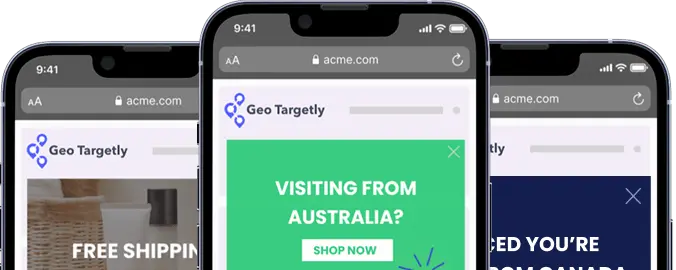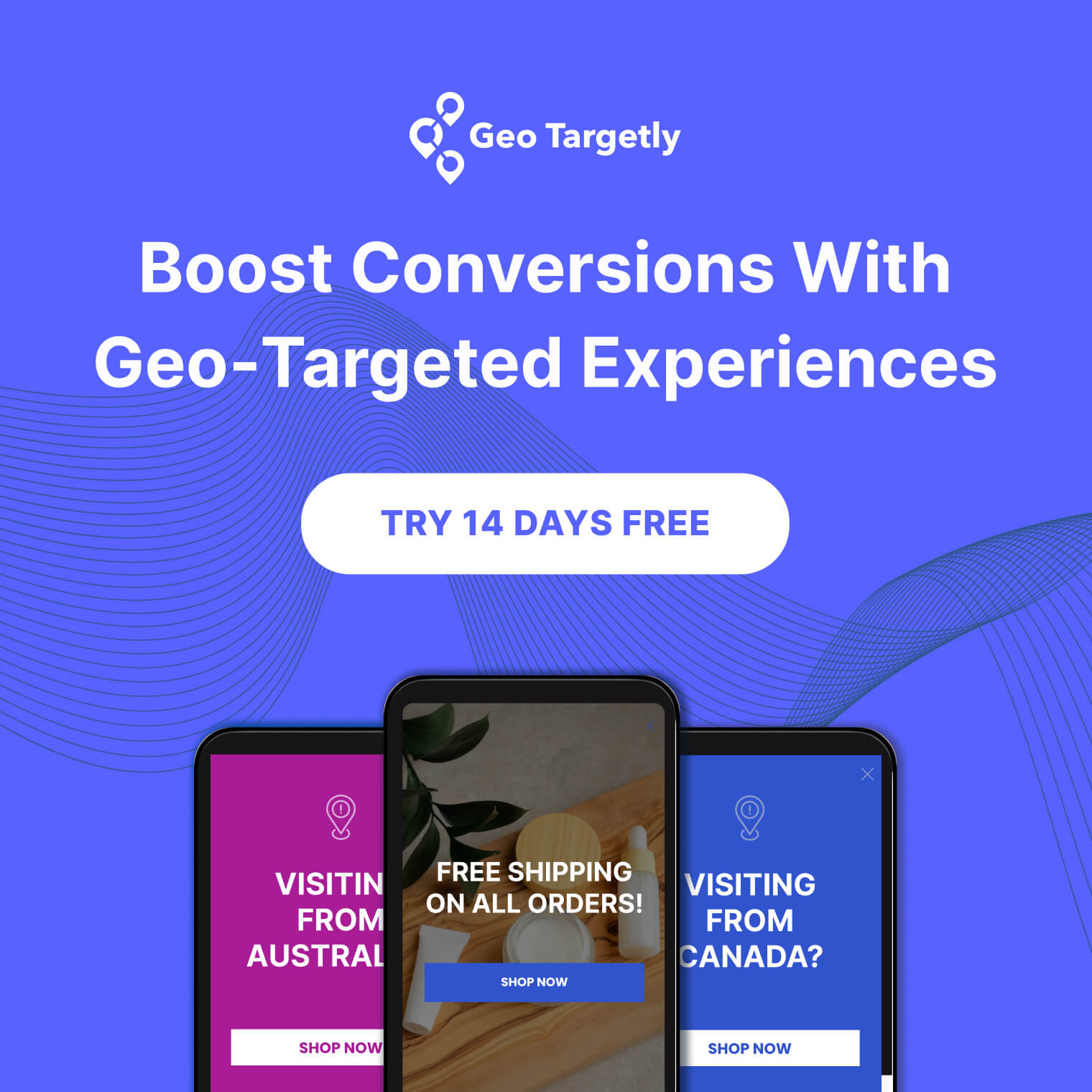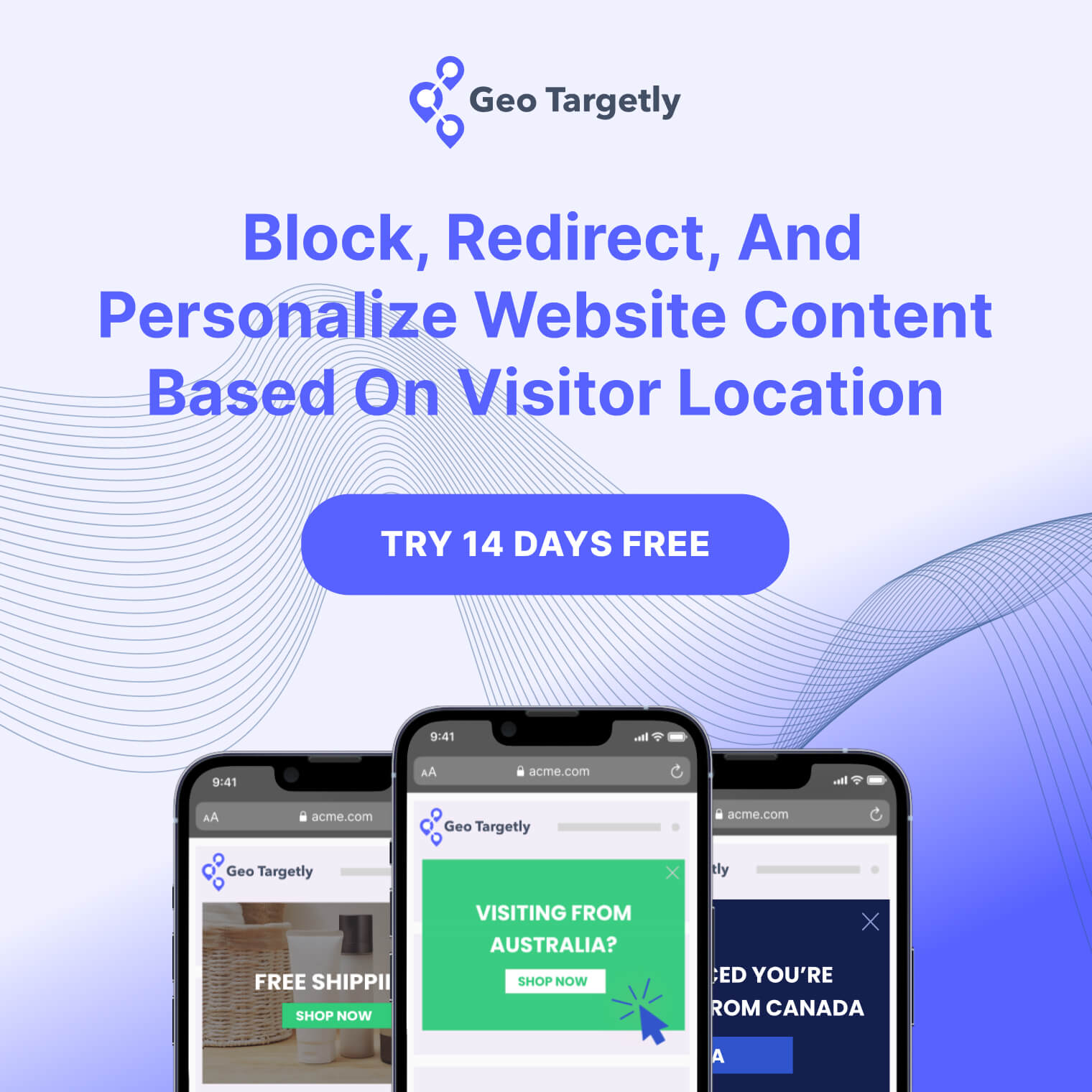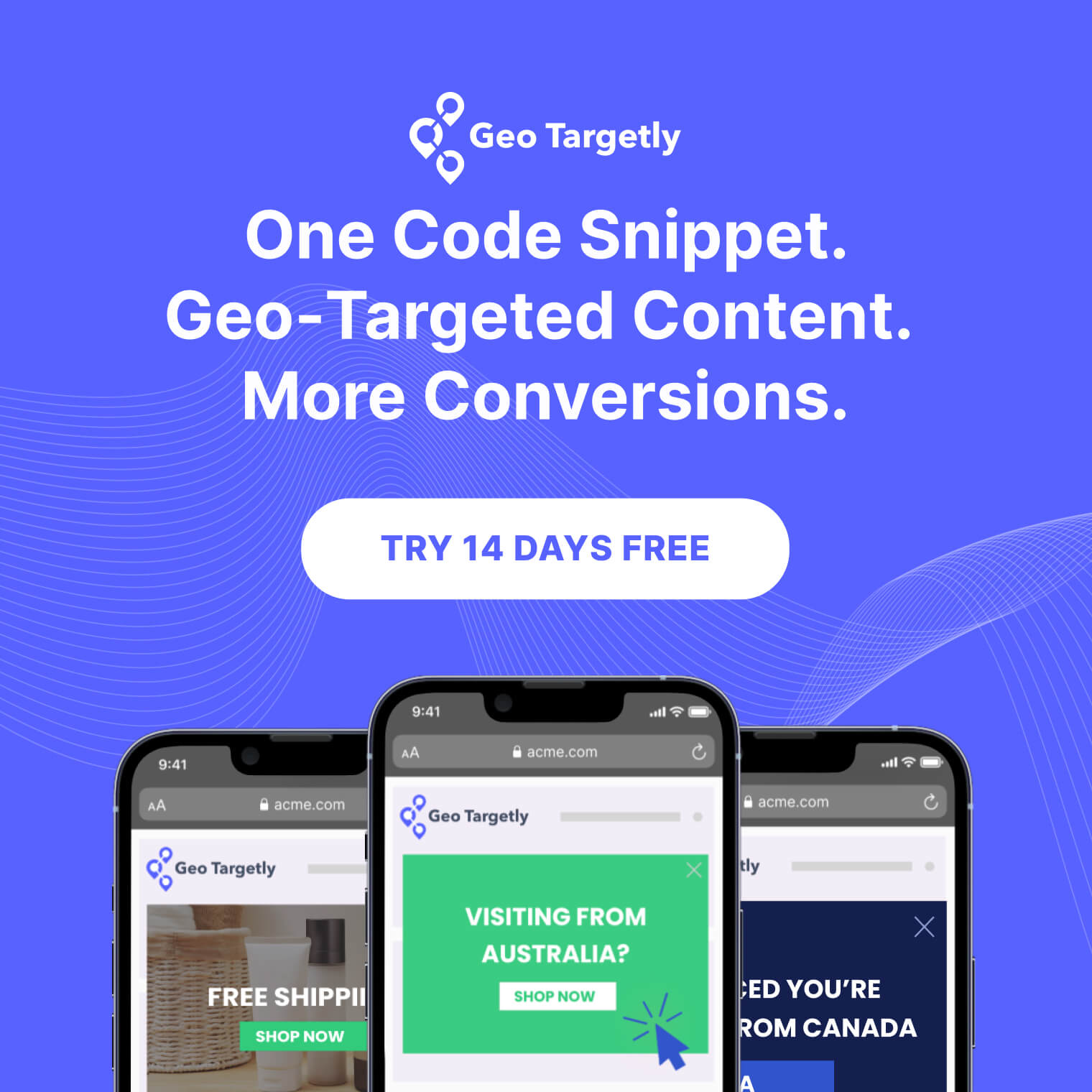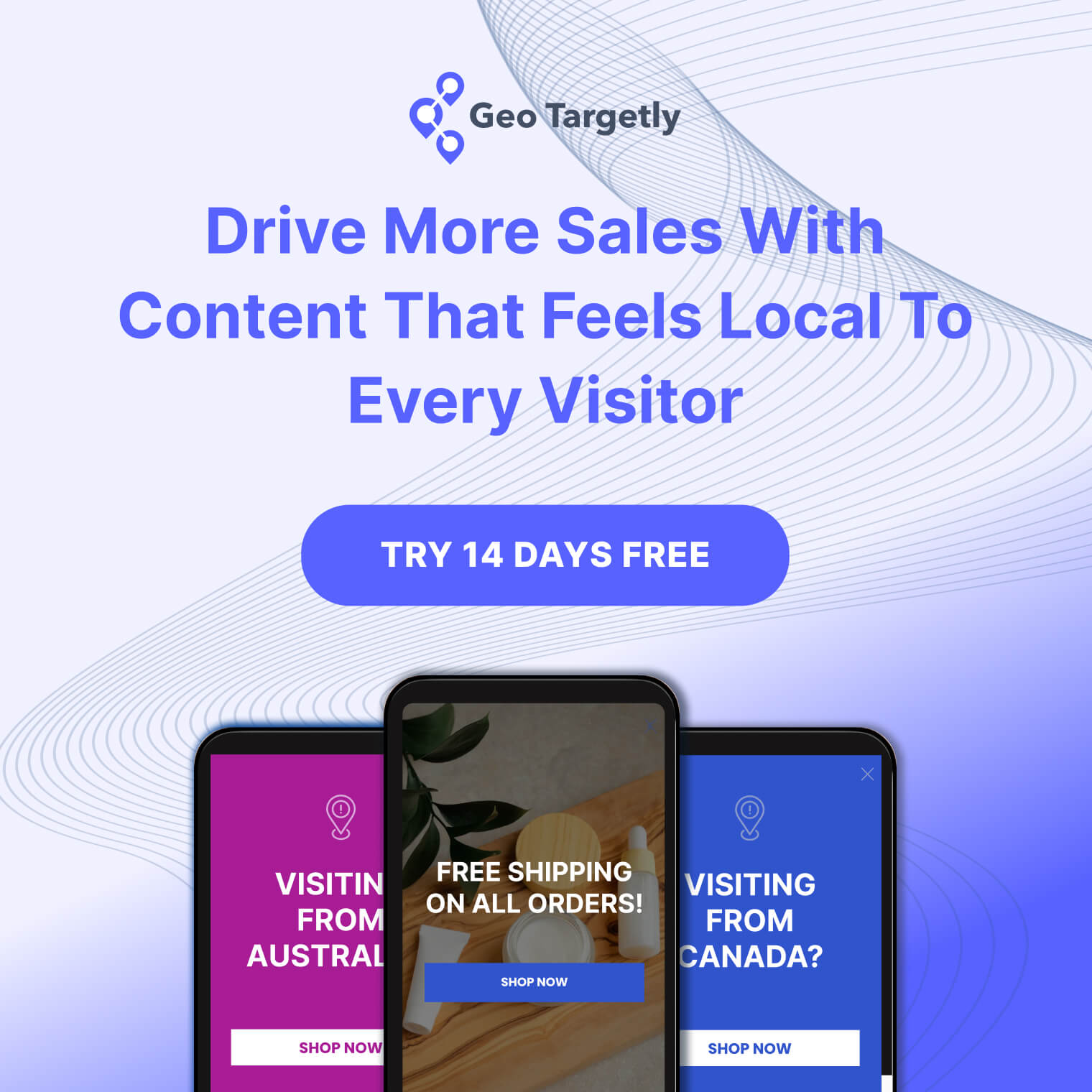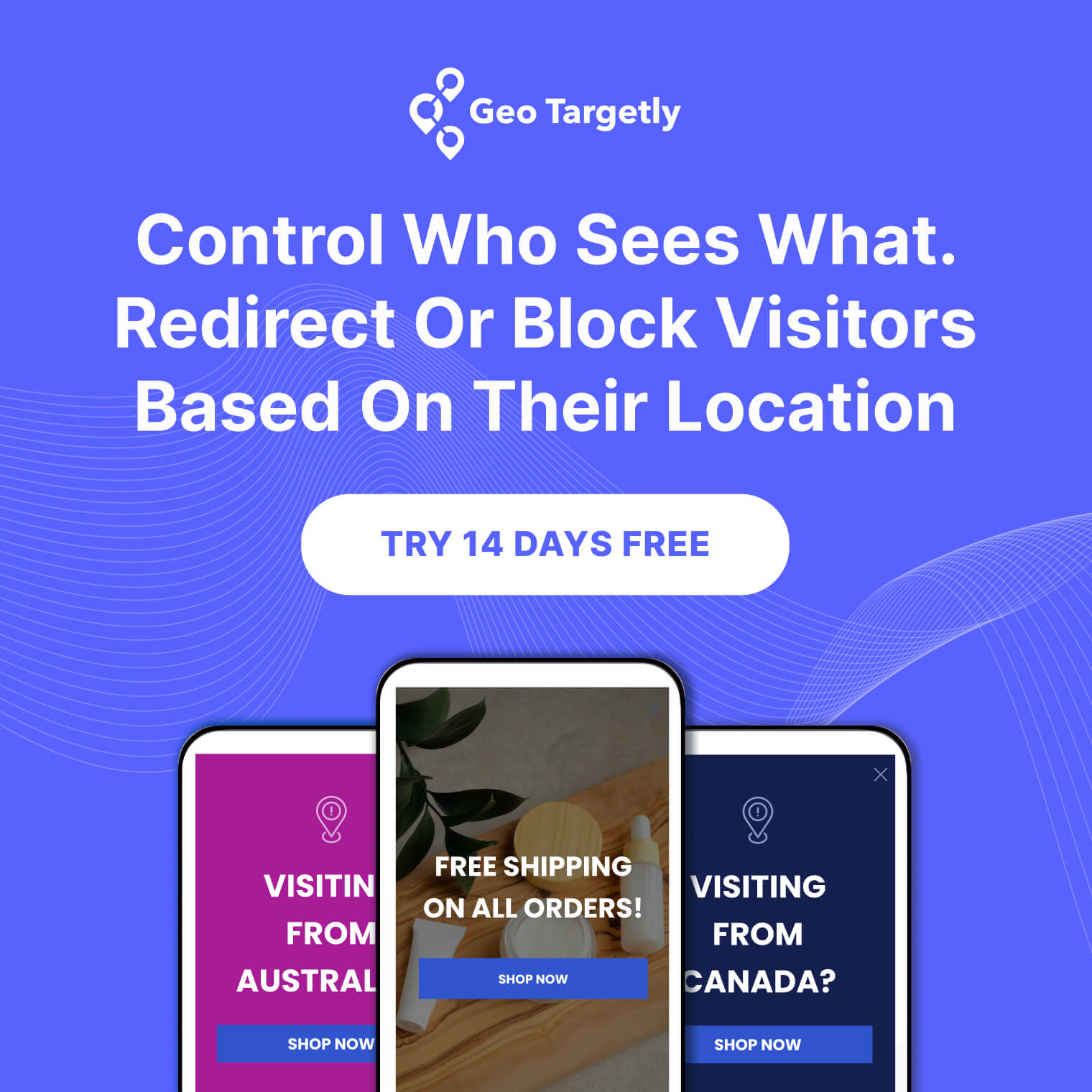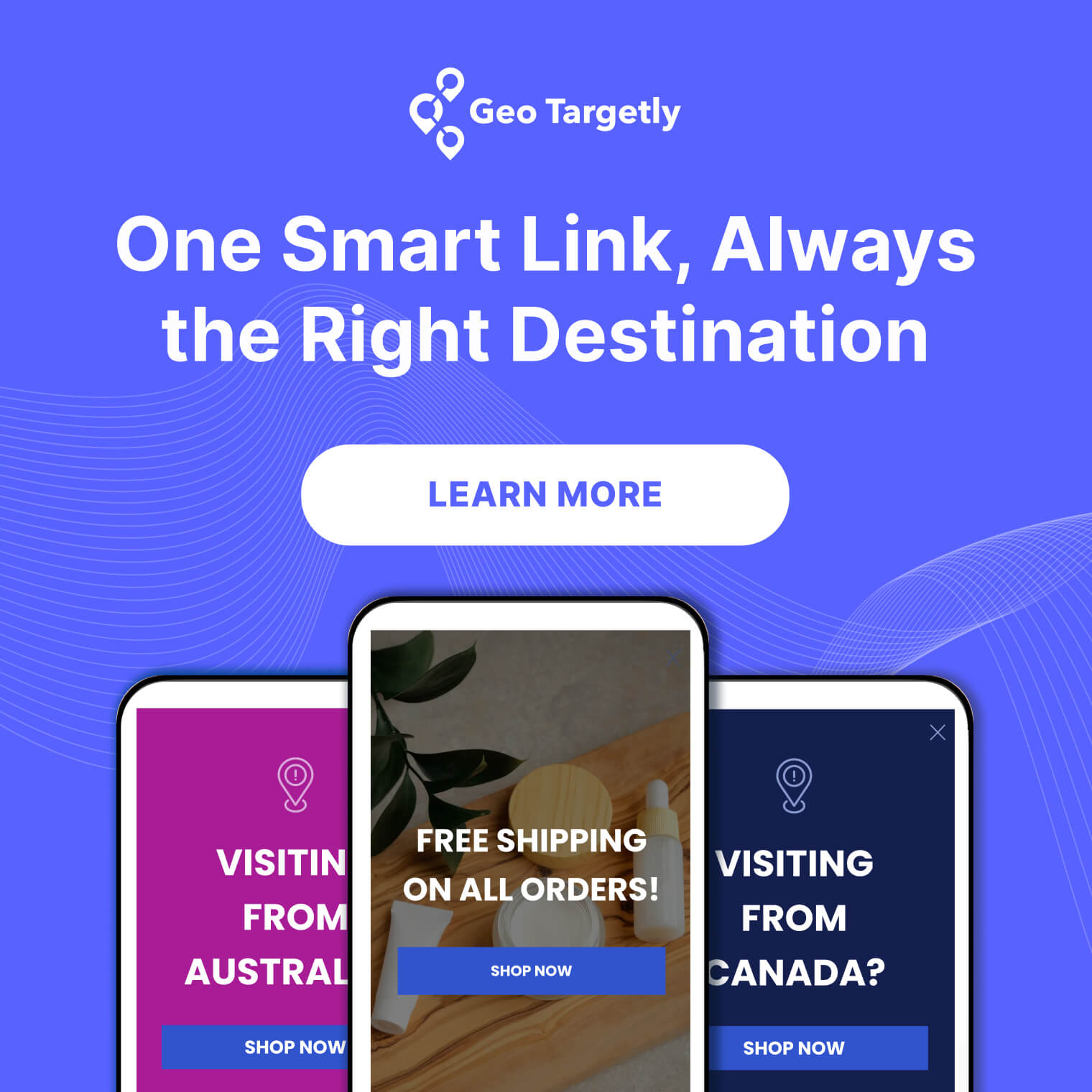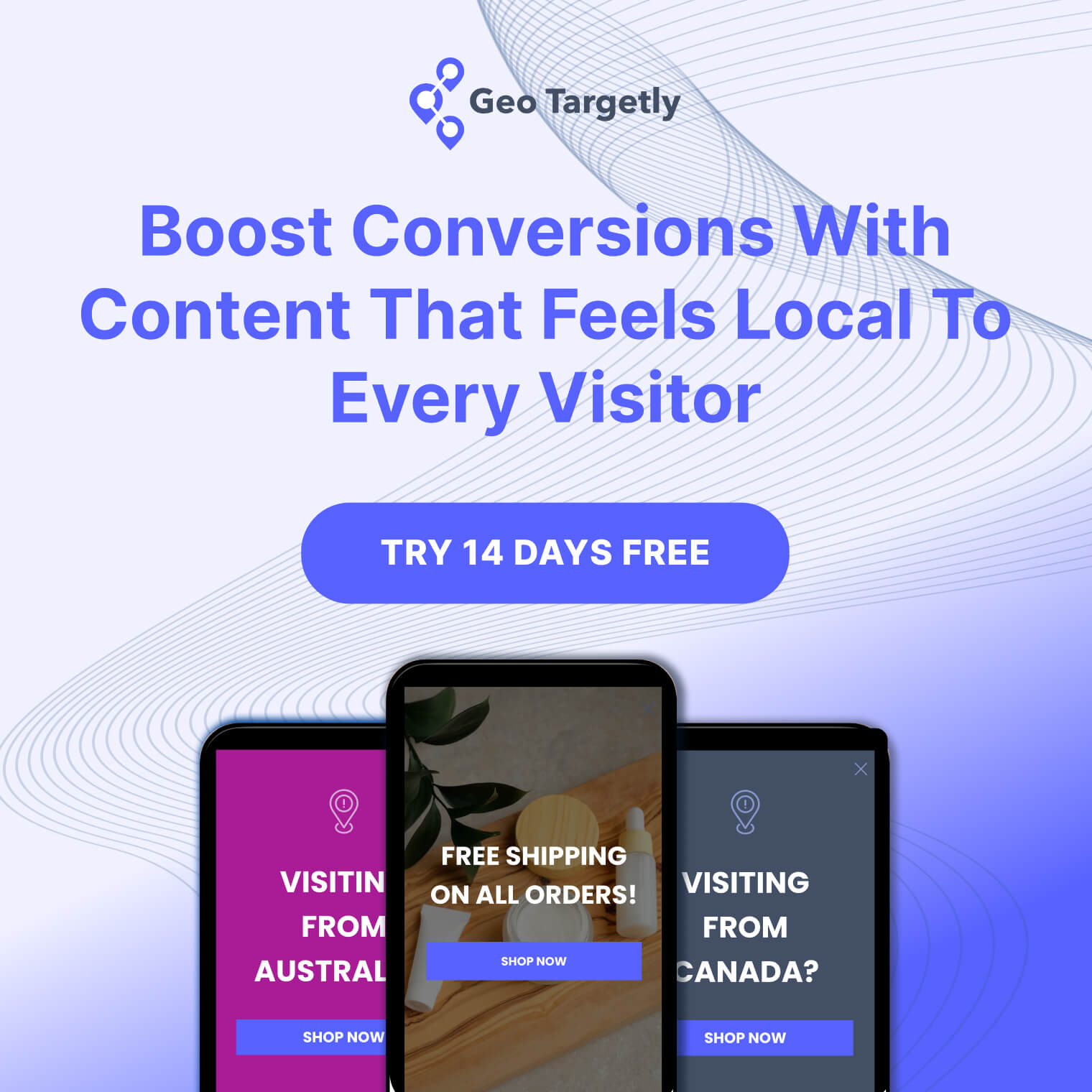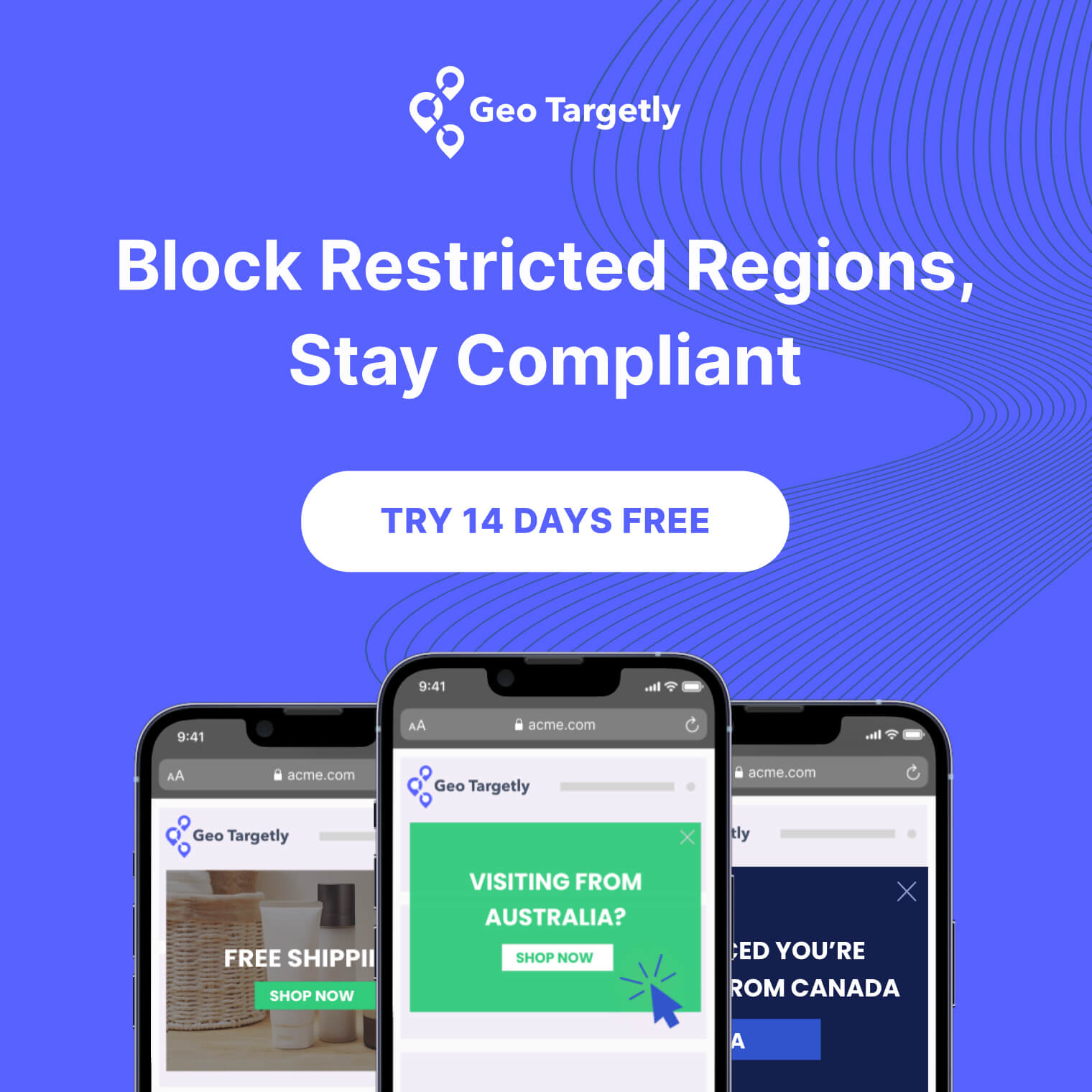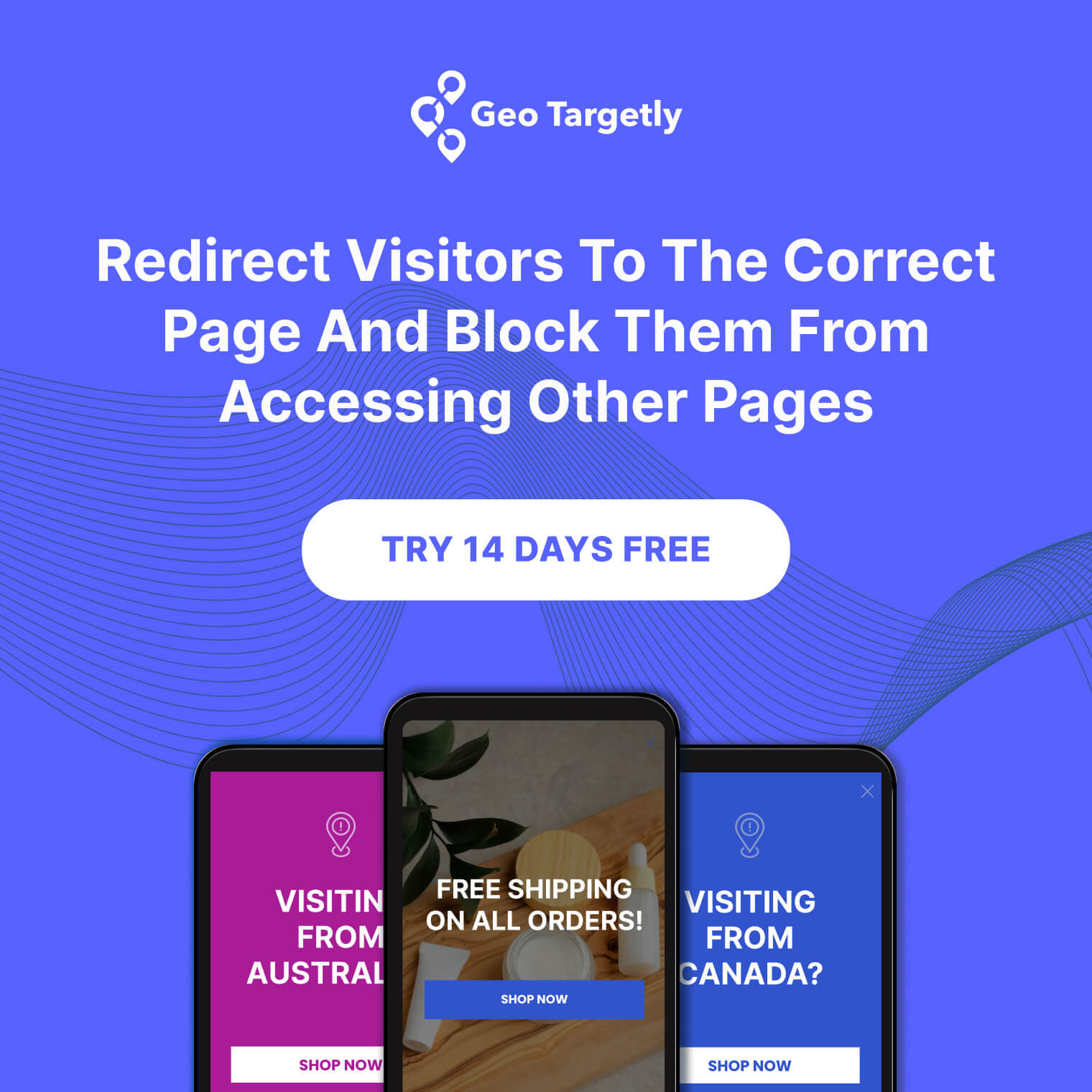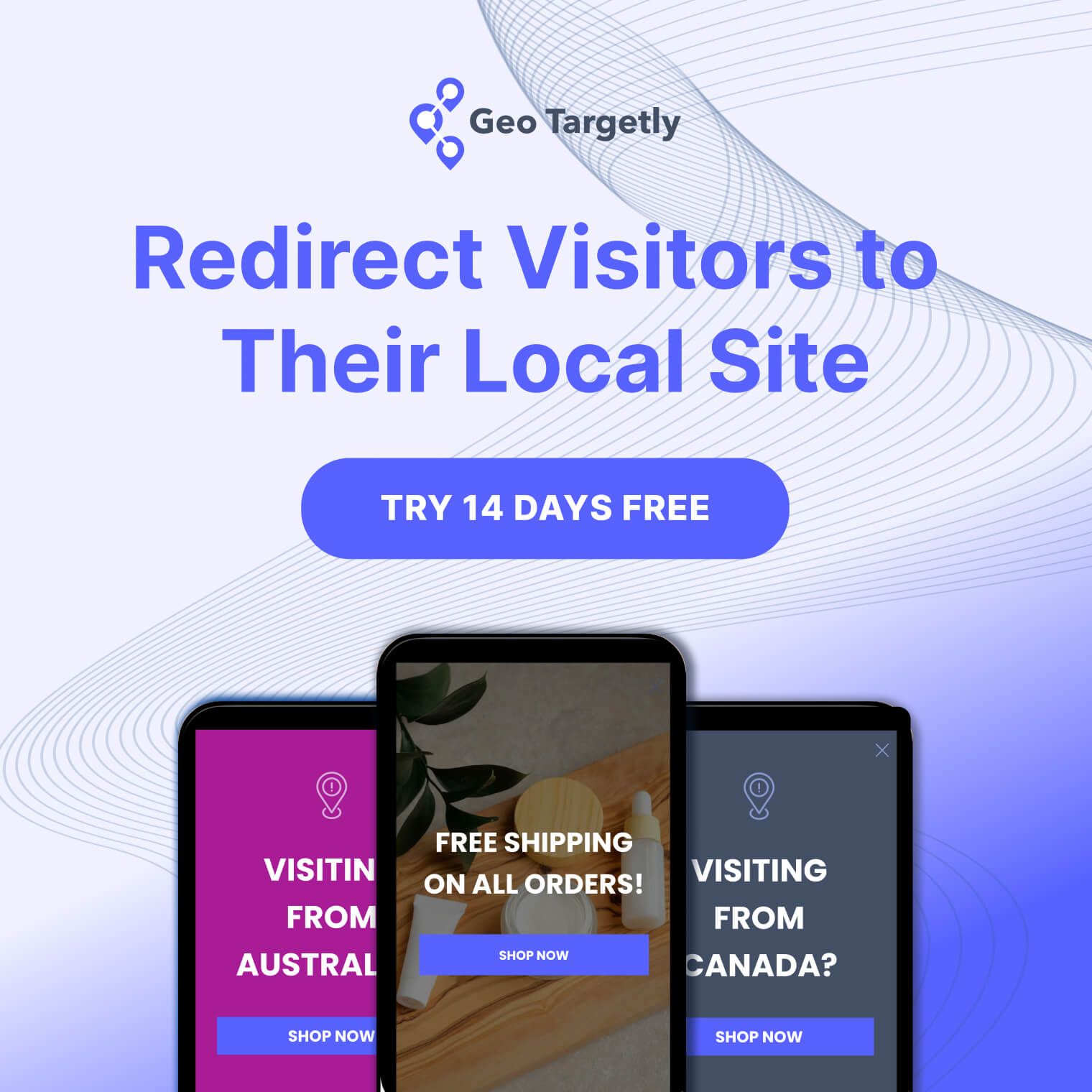

Key takeaways:
- Website personalization tools help you deliver tailored experiences that boost engagement and conversions.
- There are different types of website personalization: rule-based, behavior-triggered, and AI-driven, each with unique strengths.
- Geo Targetly stands out in 2026 as a top choice for businesses seeking fast, no-code location-based personalization.
- Choosing the right tool depends on your team’s technical skill, business maturity, and personalization goals.
- Personalization isn’t one-size-fits-all. Start small, test often, and iterate for long-term success.
Imagine visiting your favorite hangout spot and being treated like a total stranger. No one remembers what you like or why you’re there. That’s what a generic website feels like today. In fact, 74% of consumers feel dissatisfied when website content isn’t personalized.
Website personalization tools help solve this by adjusting content, offers, and experiences based on who’s visiting. Whether it’s location, behavior, or browsing history, these tools let you serve the right message to the right person at the right time.
Keep reading, and you’ll discover the best personalization tools of 2026, how they work, and which one fits your needs. Whether you’re in e-commerce, SaaS, publishing, or B2B, there’s a solution for you.
What are website personalization tools?
Website personalization tools are platforms that allow you to tailor your website experience for each visitor. Instead of showing the same homepage or product offers to everyone, you can display content that matches a visitor’s…
- Behavior
- Location
- Interest
- Stage in the buying journey
To understand how these tools work, it may be helpful to have a foundation about what website personalization is. Essentially, website personalization involves delivering content that aligns with each visitor’s context or intent.
Unlike static websites that show the same message to everyone, personalized sites adapt to what each user likely cares about. This could involve displaying different products to new versus returning users, or adjusting the language based on location.
But don’t confuse personalization with optimization; they’re completely different from one another. Optimization enhances the average experience through techniques such as A/B testing, while personalization focuses on the individual, tailoring content to specific user segments or individual users.
Types of personalization: Rule-based vs. dynamic/predictive
There are two primary ways personalization tools deliver tailored experiences:
- Rule-based personalization. You create simple if-then rules. For example, “If the visitor comes from Facebook, show a 10% discount pop-up after 10 seconds.” This method provides full control and is well-suited for teams just starting out or those with clearly defined audience segments.
- Predictive personalization. The tool utilizes machine learning to analyze user behavior and automatically serve relevant content. For instance, it might recommend products a user is likely to buy based on browsing patterns. This approach requires more data, but delivers stronger results at scale.
Why personalization tools matter
Personalization tools help you serve targeted content based on real data, leading you to a better performance across your site. When used effectively, personalization tools can deliver:
- Higher engagement as users interact more with content that matches their interests
- Lower bounce rates since irrelevant content is one of the top reasons users leave
- Better conversions because personalized experiences guide users toward action without distractions
For digital marketers, CRO specialists, and SaaS or e-commerce teams, this means fewer wasted visits and more qualified leads or sales. Instead of guessing what will work, you use real-time data to meet users where they are and move them forward.

Who needs personalization tools?
Below are the types of businesses that benefit most, along with how they utilize it to improve their results.
- E-commerce stores. Use personalization to recommend products, recover abandoned carts, and adjust offers based on visitor behavior or location. These tactics can have a major hand in boosting order value and customer loyalty.
- SaaS platforms. Personalize onboarding, highlight relevant features, or adapt CTAs based on user lifecycle stage. This drives more free-to-play conversions and reduces churn.
- Content publishers and blogs. Deliver personalized reading suggestions, show topic-based recommendations, or tailor newsletter prompts based on user interest to increase engagement and time on site.
- B2B websites and lead-gen pages. Customize messaging by industry, referral source, or firmographic data to generate more qualified leads and improve conversion rates.
Types of website personalization (with examples)
There are several ways to personalize a website, each serving a different purpose. These are the most common types used to improve engagement, conversions, and user experience.
Content personalization
This adjusts headlines, copy, and CTAs based on who’s visiting. It works well on landing pages or homepages where different users expect different messages. You can personalize by location, traffic source, or behavior. It’s quick to set up and great for improving relevance without requiring a page redesign.
Example: A visitor from Google Ads sees “Get Your First Month Free,” while an email subscriber sees “Welcome Back – Here’s 20% Off.”
Product recommendations
Used primarily in e-commerce and SaaS, this feature displays items or features based on what users’ve viewed or clicked. Some tools follow rules like “related products,” while others use AI to suggest what’s most likely to convert. It’s effective for boosting average order value and keeping users engaged.
Example: A shopper who views hiking gear is recommended trail shoes and an outdoor backpack.
Popups and overlays
These appear based on actions like scrolling, exit intent, or inactivity. Personalizing them by behavior makes them feel timely, not intrusive. They're ideal for collecting emails, offering discounts, or saving abandoned carts.
Example: A first-time visitor sees a 10% discount pop-up after 20 seconds on the site. A returning visitor sees a reminder about their saved cart.
Location-based personalization
This changes what users see based on their location. You can switch languages, show local pricing, or redirect to regional pages. It’s best for global websites and requires minimal user data. Tools like Geo Targetly handle this with minimal setup.
Example: A user in Germany sees prices in euros and German-language product descriptions, whereas US visitors see prices in USD and English.

12 best website personalization tools (2026)
Now that you know what website personalization and tools are, including why it matters, especially to your business, here’s a curated list of 12 best website personalization tools to consider in 2026:
1. Geo Targetly

Geo Targetly is a powerful geo-location toolkit built for marketers who want to deliver localized experiences without heavy development work. From auto-redirecting visitors to regional pages to swapping currencies or languages, it makes location-based personalization fast and simple.
Strengths
- Easy, no-code setup with a lightweight script
- Wide variety of location targeting options (country, city, radius)
- Works across any CMS or website builder
Best for
- Global eCommerce brands that need to localize and personalize content and pricing
- SaaS companies serving multiple markets
- Marketing teams that want location personalization without developer support
Notable features
- Geo Redirect. Send users to a local version of your site based on their location
- Geo Block. Restrict access from specific countries, states, or cities
- Geo Image. Show location-specific images to visitors
- Geo Popups. Display location-based popups with offers or alerts
- Geo Bar. Add location-specific banners across your site
- Geo Location. Access visitor geolocation data (country, state, city, latitude, etc.) for custom logic
- Geo Exit-intent. Show geo-targeted popups when visitors are about to leave
- Geo URL Shortener. Create short URLs that redirect users based on their location
- Geo Currency. Dynamically display pricing, shipping, and offers in local currency
- Geo Consent. Show region-specific cookie consent banners (GDPR, CCPA compliance)
- Geo Links. Smart URLs that take visitors to location-specific pages or products
Price range
Starts at around $8/month, with scalable plans depending on usage.
Want to take advantage of all these features and start delivering personalized content?
2. OptinMonster

OptinMonster is best known for helping websites capture more leads and sales through targeted popups, forms, and campaigns. With its drag-and-drop builder and advanced targeting rules, it’s a go-to choice for marketers who want conversions without coding.
Strengths
- Highly intuitive visual builder with hundreds of templates
- Behavior-driven triggers like exit-intent, scroll depth, and time-based popups
- Built-in A/B testing for optimizing campaigns
Best for
- Small to mid-sized businesses, bloggers, and eCommerce stores
- Marketing teams focused on lead generation and list building
- Agencies running campaigns across multiple clients
Notable features
- On-site retargeting to show tailored offers for new vs. returning visitors
- Exit-intent technology to recover abandoned visitors
- Gamified opt-ins (like spin-to-win wheels) that boost engagement
Price range
Affordable plans starting under $10/month, with advanced tiers up to $50/month for larger sites.
3. OptiMonk
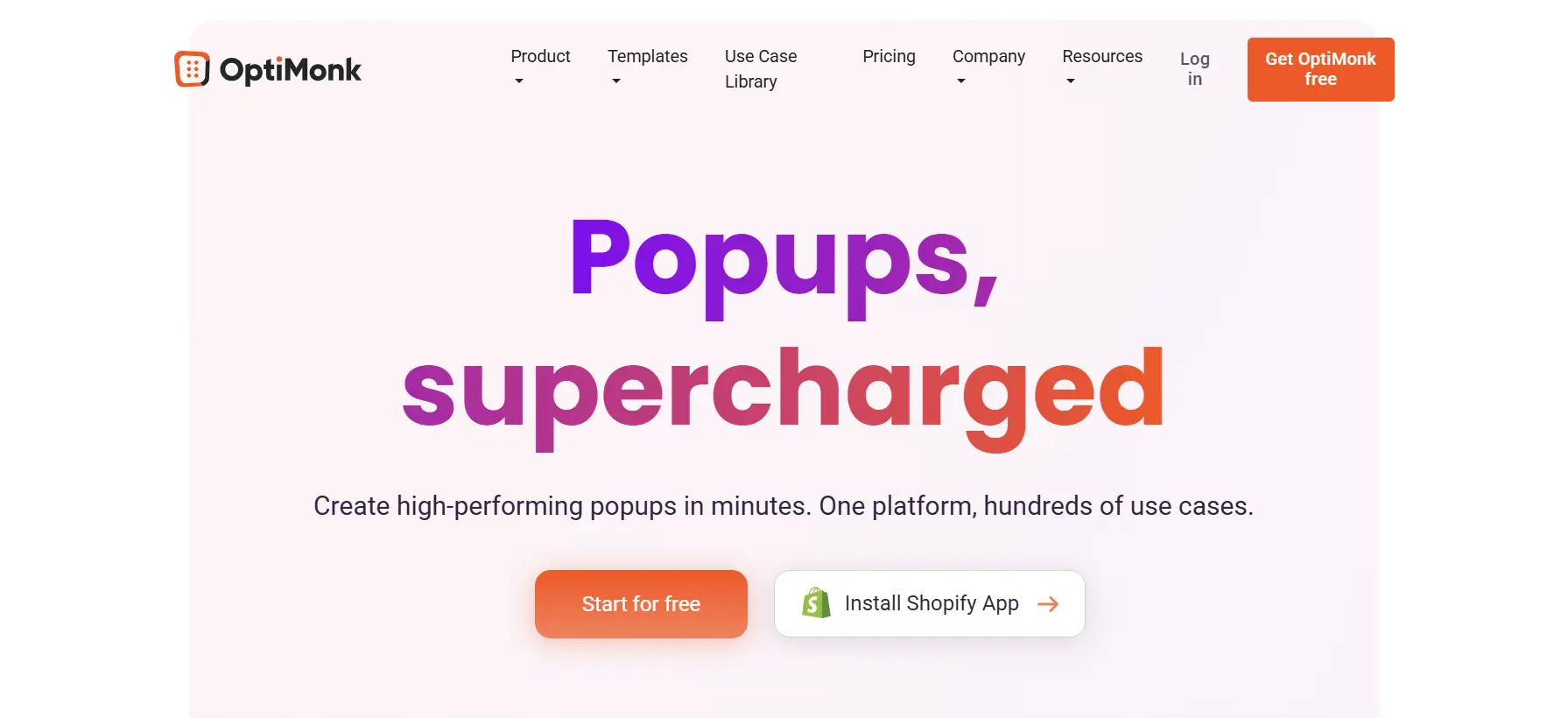
OptiMonk is a website personalization and conversion optimization platform that helps you create tailored experiences with ease. Beyond popups, it offers personalized product recommendations, dynamic messages, and behavioral targeting.
Strengths
- Wide personalization toolkit (not just popups)
- Strong focus on e-commerce growth with templates designed for sales funnels
- Easy-to-use drag-and-drop editor with fast setup
Best for
- E-commerce stores aiming to increase average order value and reduce cart abandonment
- SaaS companies looking to personalize onboarding and upsells
- Marketers who want advanced personalization without deep technical knowledge
Notable features
- Personalized product recommendations based on browsing and purchase history
- Dynamic messages and banners that adapt to user behavior, traffic source, or campaign
- Exit-intent and cart abandonment pop-ups to recover lost sales
- Segmentation & targeting using behavior, location, referral source, or custom attributes
- A/B testing and analytics to optimize performance continuously
- Integrations with Shopify, WooCommerce, HubSpot, Klaviyo, and other major platforms
Price range
Free plan available with basic features. Paid plans start around $19/month, scaling up with advanced personalization and higher traffic limits.
4. Dynamic Yield

Dynamic Yield is also one personalization platform on the market, trusted by enterprise brands. It uses AI and machine learning to deliver individualized experiences across web, mobile, email, and even kiosks. If you’re looking for predictive personalization at scale, this is the tool you need
Strengths
- Enterprise-grade solution with AI-driven recommendations
- Omnichannel personalization (beyond just websites)
- Deep analytics and testing capabilities
Best for
- Large e-commerce and retail brands
- Enterprises with multi-channel customer journeys
- Teams that need advanced personalization backed by data science
Notable features
- AI-powered product recommendations that adapt to each user in real time
- Segmentation engine with hundreds of behavioral and contextual attributes
- Dynamic content and messaging for websites, apps, and emails
- A/B and multivariate testing at scale
- Experience APIs that allow personalization to extend beyond websites (e.g., in-store kiosks, call centers)
- Strong integrations with CRMs, CDPs, and analytics platforms
Price range
Pricing is customized based on business size and needs. Typically positioned at the enterprise level, with annual contracts.
5. Adobe Target
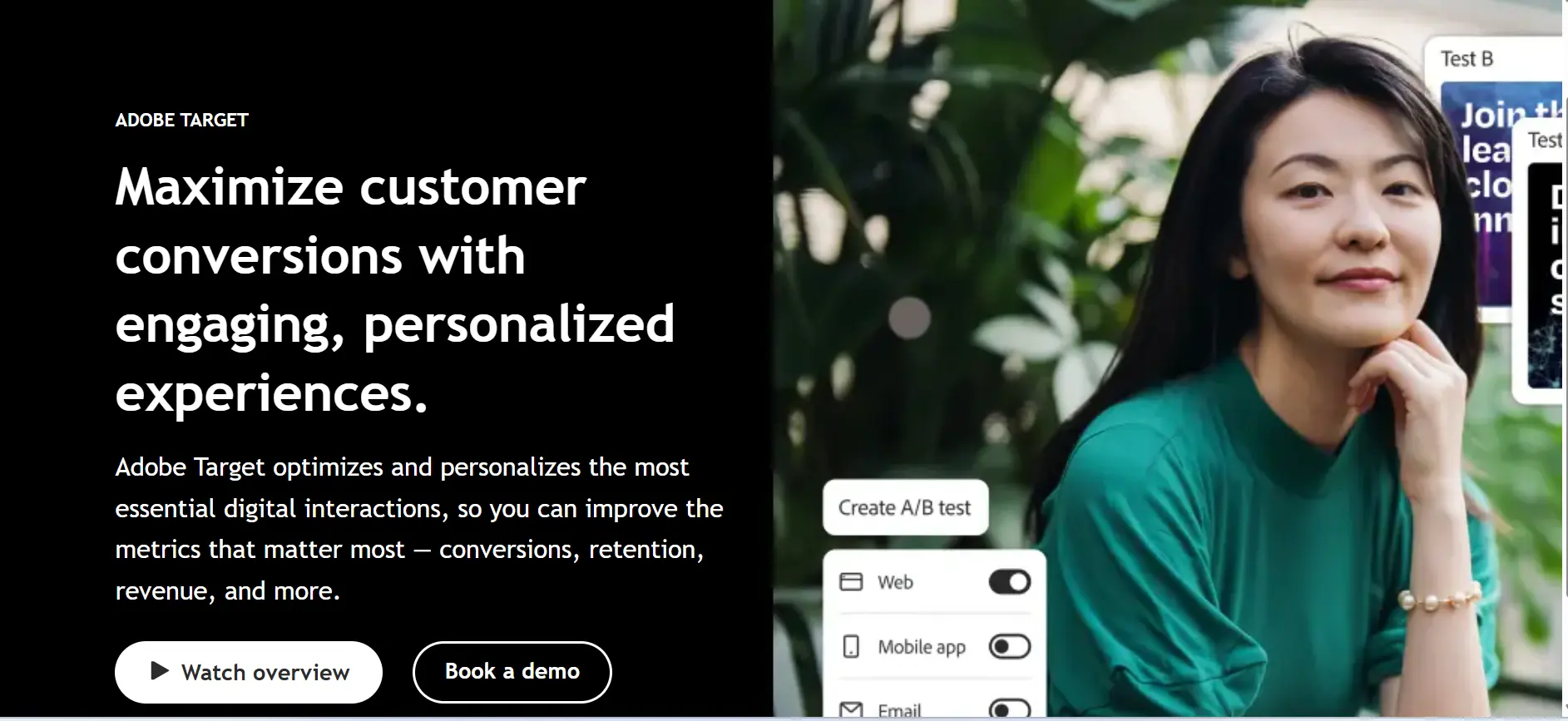
Adobe Target is part of the Adobe Experience Cloud and is a leader in enterprise-level personalization. It combines A/B testing, AI-driven recommendations, and automation to deliver consistent, tailored experiences across channels. Best suited for organizations already invested in Adobe’s ecosystem.
Strengths
- Deeply integrated with Adobe Analytics and Adobe Experience Manager
- Advanced AI personalization powered by Adobe Sensei
- Scalable for enterprises with complex digital ecosystems
Best for
- Enterprises with large digital teams and multiple customer touchpoints
- Businesses already using Adobe Experience Cloud products
- Organizations needing advanced personalization across web, apps, and more
Notable features
- AI-powered recommendations that adapt content and product offers in real time
- A/B, multivariate, and automated testing to continuously optimize user experiences
- Automated decisioning to deliver the “next best offer” at scale
- Cross-channel personalization (web, mobile, email, IoT, call centers)
- Robust integrations with Adobe’s ecosystem and third-party platforms
- Strong governance tools for enterprise teams (workflow management, approval layers, compliance settings)
Price range
Pricing is enterprise-level and typically requires a custom quote. It’s best suited for large organizations with the budget and team to maximize its capabilities.
6. Ninetailed (now owned by Contentful)
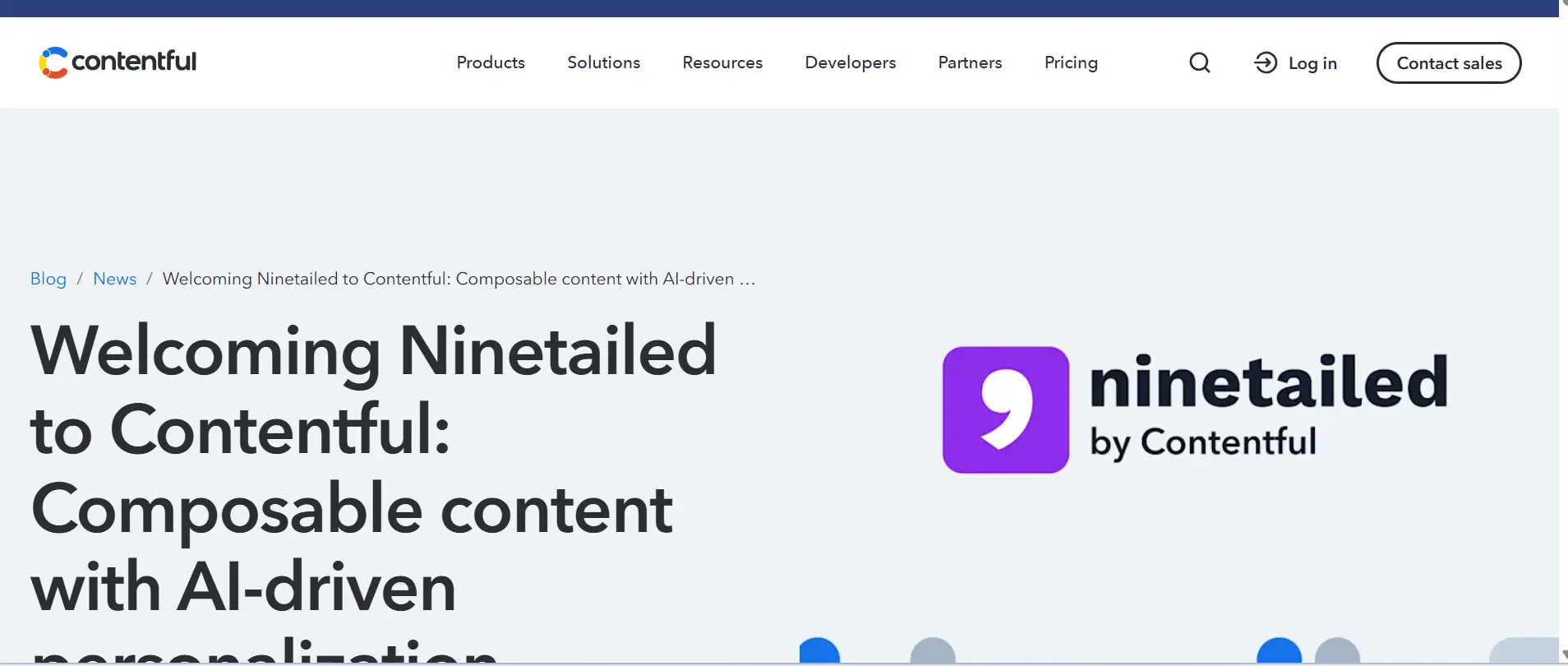
Ninetailed is a personalization and experimentation platform built specifically for modern, headless CMS environments. It integrates seamlessly with Contentful and other composable architectures, making it a favorite for teams adopting a headless or JAMstack approach.
Strengths
- Designed for headless CMS and composable architecture
- Lightweight, API-first, and developer-friendly
- Strong support for personalization and experimentation in content-driven websites
Best for
- Content-heavy websites built on Contentful or similar CMSs
- SaaS companies and publishers embracing composable tech stacks
- Development teams that want flexibility without adding heavy plugins
Notable features
- API-first personalization engine for content variations at scale
- A/B and multivariate testing with data-driven insights
- Segment-based targeting using behavioral, contextual, or firmographic data
- Contentful integration for seamless personalization in a headless CMS
- Omnichannel personalization that can extend to apps and other digital touchpoints
- Developer-friendly SDKs for fast, customizable implementations
Price range
Pricing depends on usage and scale, typically starting with custom quotes for mid-sized teams and enterprises. Additionally, pricing is now integrated into Contentful plans.
7. Bloomreach
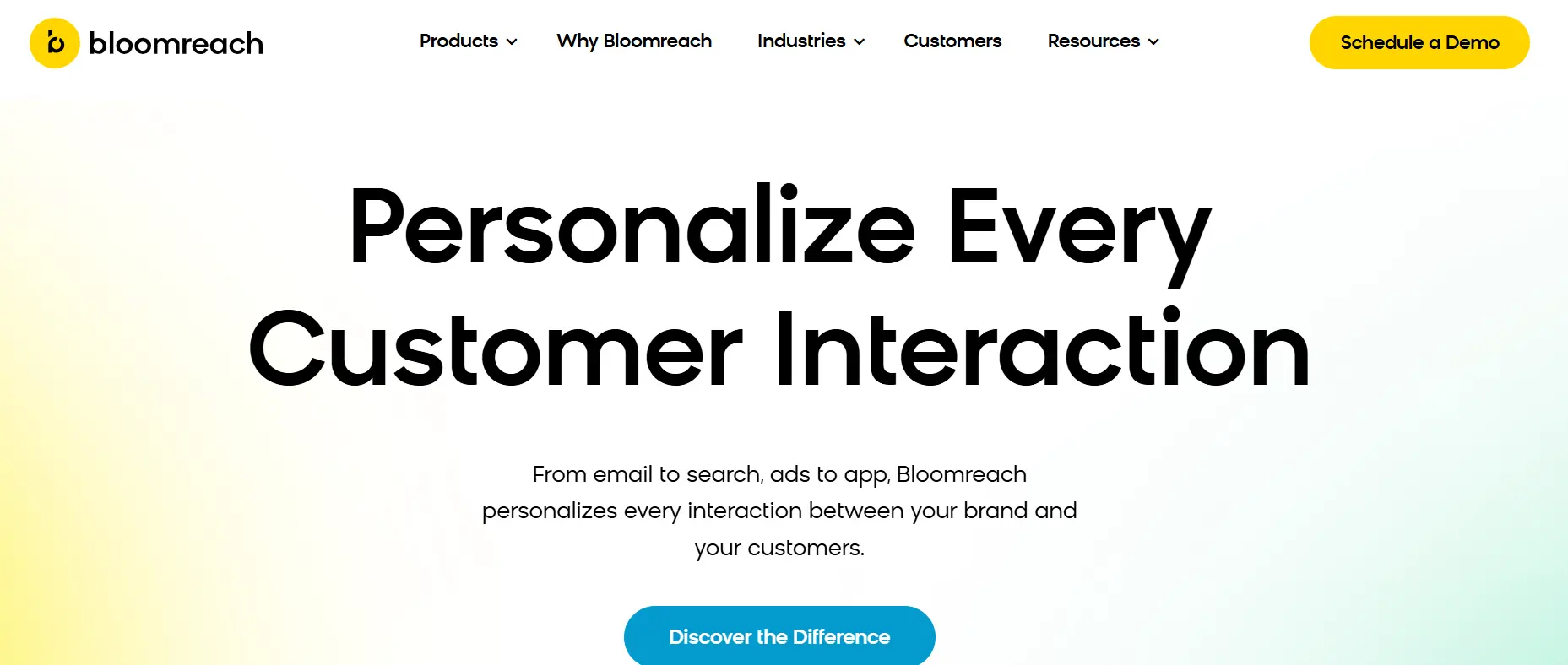
Bloomreach is a digital experience platform that combines personalization, product discovery, and customer data management. It’s widely used in e-commerce because it helps brands deliver highly relevant search results, product recommendations, and content experiences at scale.
Strengths
- Combines personalization with powerful site search and merchandising tools
- AI-driven product discovery for large catalogs
- Strong CDP (customer data platform) capabilities for unified insights
Best for
- Mid-sized to enterprise e-commerce businesses
- Brands with large or complex product catalogs
- Teams that want a single solution for search, personalization, and customer data
Notable features
- AI-powered product discovery that improves search relevance and conversion
- Personalized product recommendations based on behavior and intent
- Content personalization to adapt landing pages and campaigns to each visitor
- Customer Data Platform (CDP) for unifying customer profiles and segments
- Merchandising controls that let marketers influence AI-driven recommendations
- Integrations with popular eCommerce platforms like Shopify, Salesforce Commerce Cloud, and Magento
Price range
Enterprise-level pricing with custom quotes based on business size, data volume, and feature set.
8. ConvertFlow
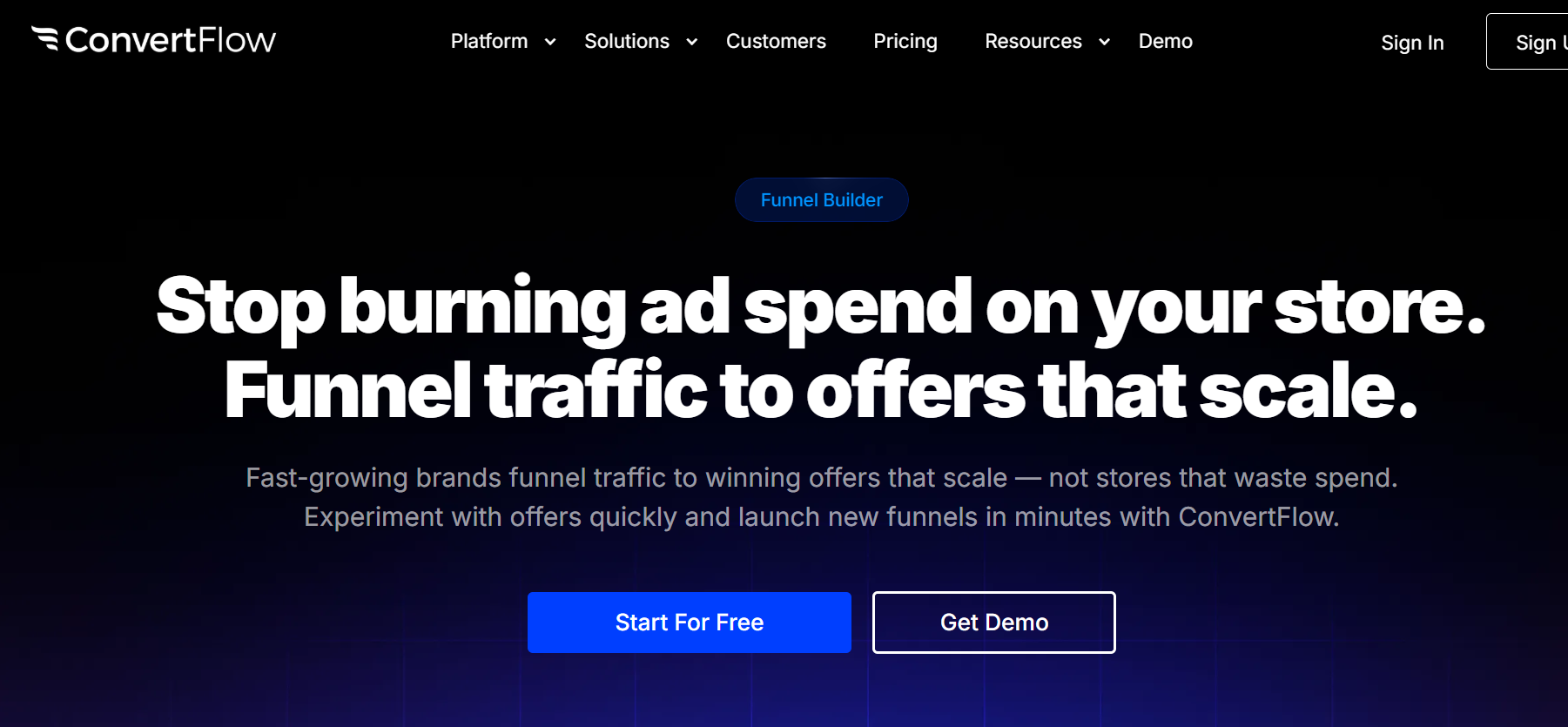
ConvertFlow is a no-code personalization platform focused on creating targeted CTAs, forms, and landing pages. It helps marketers design and launch personalized campaigns quickly, without waiting on developers.
Strengths
- Extremely user-friendly, with a drag-and-drop builder
- Flexible enough for both lead generation and sales funnels
- Strong audience segmentation tools for precise targeting
Best for
- Small to mid-sized businesses that need fast personalization without coding
- Marketing agencies managing campaigns across multiple clients
- Teams focused on generating leads and building funnels
Notable features
- Personalized CTAs that adapt to visitor segments or behaviors
- Dynamic forms and popups for list building and lead capture
- Landing page personalization with easy duplication and editing
- Audience segmentation based on source, behavior, or CRM data
- Integrations with major CRMs and email tools like HubSpot, ActiveCampaign, and Mailchimp
- A/B testing to refine messaging and improve conversions
Price range
Free plan available. Paid plans start around $99/month for the landing page tools, scaling up based on traffic and features.
9. If-So
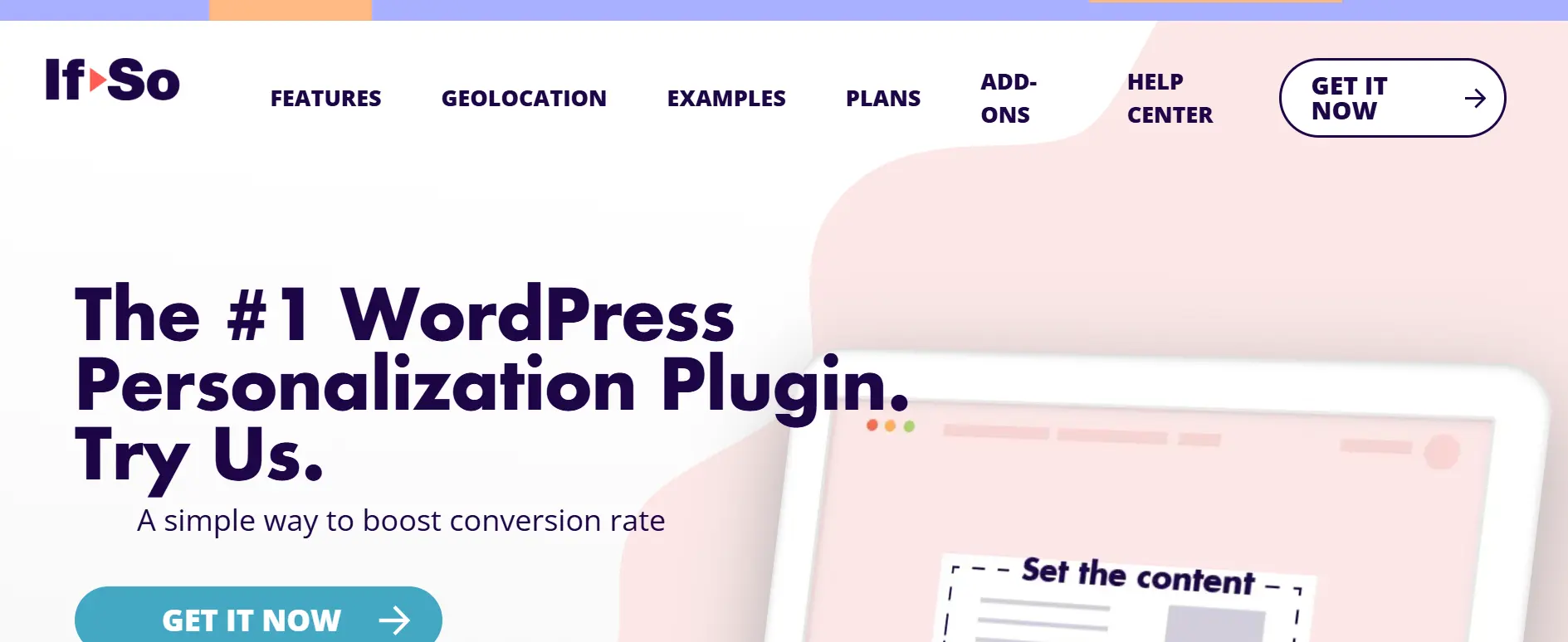
If-So is a dynamic content personalization plugin built specifically for WordPress. It allows site owners to display different content to different visitors based on a wide variety of conditions, making it a simple but powerful way to customize user experiences.
Strengths
- Built for WordPress, so setup is fast and intuitive
- No coding required, but flexible enough for developers to extend
- Affordable compared to enterprise personalization platforms
Best for
- WordPress site owners, bloggers, and small businesses
- Agencies managing multiple WordPress client sites
- Teams that want an easy way to test personalization without complex setups
Notable features
- Conditional content rules based on location, referral source, time, device, or custom parameters
- Dynamic text replacement to automatically personalize headlines and copy
- Shortcode-based system for inserting personalized elements anywhere on a page
- Integration-friendly with WooCommerce, Google Ads, and CRMs
- A/B testing to measure the performance of variations
- Geolocation targeting for language, currency, or localized offers
Price range
Starts at around $97/year, with flexible plans for single sites or agencies managing multiple installs.
10. Logic Hop

Logic Hop is another WordPress-focused personalization tool, but with a more advanced rules engine and integrations than simpler plugins. It helps you create deeply customized user experiences based on behavior, location, and data from third-party platforms.
Strengths
- Robust targeting and personalization for WordPress
- Advanced logic rules allow for complex conditions
- Strong integrations with marketing tools and analytics
Best for
- WordPress site owners looking for more than basic personalization
- Marketing teams that want to connect personalization with CRM or ad platforms
- Agencies building tailored experiences for high-traffic WordPress sites
Notable features
- Condition-based personalization using dozens of triggers (location, pages viewed, device, referral, time on site, etc.)
- Dynamic text replacement for personalized copywriting at scale
- Content personalization for landing pages, forms, and CTAs
- Geolocation targeting for region-specific offers and experiences
- Integrations with Google Analytics, HubSpot, Drip, ConvertKit, and WooCommerce
- A/B testing is built in to optimize variations
Price range
Plans start at around $199/year for single-site use, with higher tiers for multiple sites and agencies.
11. Monetate
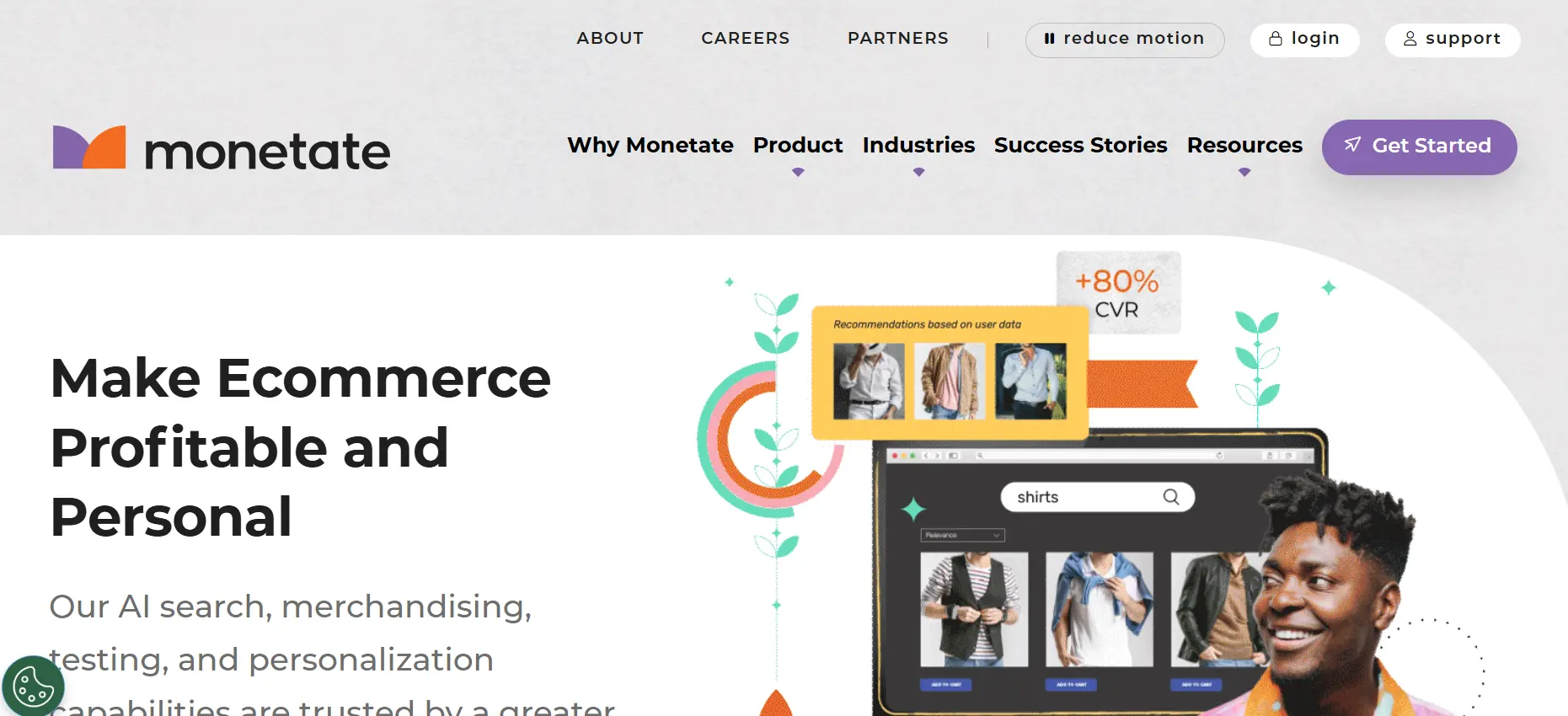
Monetate is a well-established personalization platform trusted by large retailers and enterprises. It’s designed to deliver tailored experiences across web, email, and other digital touchpoints, with a strong focus on testing and optimization at scale.
Strengths
- Enterprise-grade platform with advanced personalization and testing
- Strong analytics and segmentation engine
- Proven track record with global retail and e-commerce brands
Best for
- Large e-commerce and retail businesses
- Enterprises managing personalization across multiple channels
- Teams with the resources to run data-driven, high-volume personalization
Notable features
- Real-time segmentation based on behavior, demographics, and context
- Dynamic content and product recommendations across web and email
- A/B, multivariate, and adaptive testing for continuous optimization
- Omnichannel personalization with experiences extending beyond the website
- Robust reporting and analytics for measuring ROI and user behavior
- Integration with major e-commerce platforms, CRMs, and CDPs
Price range
Enterprise-level pricing with custom quotes. Typically best suited for mid-to-large businesses investing heavily in personalization.
12. Google Optimize (and alternatives)
Google Optimize was one of the most widely used free tools for A/B testing and basic personalization. However, Google sunset the product in 2023, leaving many businesses searching for alternatives. Today, several tools fill that gap by offering simple and affordable personalization and testing options.
Strengths
- Historically free and easy to set up with Google Analytics
- Popular entry point for teams new to personalization
- Its alternatives still serve as lightweight, budget-friendly solutions
Best for
- Small businesses or teams just starting with personalization
- Marketers looking for a simple A/B testing and targeting solution
- Companies already using Google Analytics or GA4
Notable features (of alternatives)
- VWO Testing & Personalization: A leading Optimize replacement with advanced testing and segmentation
- Convert Experiences: Focused on privacy-compliant A/B testing and personalization
- Adobe Target (entry-level use): Often recommended for teams transitioning from Optimize to a more scalable solution
- Optimizely Web Experimentation: Enterprise-grade, but available at smaller scales too
Price range
While Google Optimize was free, its alternatives vary. VWO and Convert offer plans starting around $50-$300/month, while Optimizely and Adobe Target scale higher for enterprise use.
How to choose the right website personalization tool
With dozens of personalization platforms on the market, it’s easy to feel overwhelmed. The key is to match the tool to your business maturity, team resources, and specific goals. Here’s a structured way to evaluate:
Match to your maturity level
- Beginner (just starting with personalization). Focus on tools that let you launch quick wins without complexity. Rule-based systems are ideal because they’re easy to understand and implement. You can start by:
- Showing location-based popups (like free shipping for US visitors)
- Changing CTAs for different traffic sources (for example, “Book a Demo” for LinkedIn leads, “Start Free Trial” for organic traffic)
- Intermediate (scaling personalization with data). Once you have steady traffic and data, you’ll want to move beyond static rules. Tools at this level enable:
- Behavioral targeting (e.g., recommending products based on past browsing)
- Segmentation (showing different content to new vs. returning users, etc.)
- A/B testing to validate what works best.
- Advanced (enterprise or omnichannel needs). At this stage, personalization becomes predictive and AI-driven. These tools are built for enterprises managing millions of users across multiple channels:
- Real-time recommendations powered by machine learning
- Cross-channel personalization spanning web, email, mobile, and even in-store kiosks
- Deep integrations with customer data platforms (CDPs) for 360° profiles.
Key selection criteria
When comparing tools, keep these dimensions in mind:
- Integrations. Verify that the tool integrates seamlessly with your CMS (WordPress, Shopify, Contentful, etc.), CRM (HubSpot, Salesforce, etc.), and analytics stack. Without integration, personalization becomes siloed.
- Ease of use vs. developer dependency. (1) If you want marketers to launch campaigns independently, prioritize no-code solutions with visual builders. (2) If you have engineering support and need flexibility, choose API-first platforms like Ninetailed.
- Privacy and compliance. Make sure the tool supports GDPR/CCPA compliance, cookie consent, and the use of first-party data. Privacy lapses can erode trust and lead to fines.
- Use case alignment. Don’t overbuy. If you mainly need geo-location targeting, Geo Targetly is smarter (and more cost-effective) than an enterprise AI system. Conversely, if you’re an enterprise retailer, you’ll quickly outgrow lightweight pop-up tools.
- Cost vs. ROI potential. (1) Entry-level tools cost as little as $10-$30/month. Great for testing. (2) Mid-tier solutions run $50-$200/month, ideal for growing brands. (3) Enterprise platforms often require six-figure annual contracts but can drive significant ROI when scaled. Always start small, measure the results, and only upgrade when the ROI justifies the investment.
Why Geo Targetly is a smart choice for location-based personalization
Not every business needs enterprise-level AI personalization. For many, the fastest wins come from tailoring experiences based on where visitors are located. That’s where Geo Targetly stands out.
Location is one of the most reliable signals you can use for personalization. A visitor in Germany expects different pricing, shipping options, and possibly even a different language than a visitor in the US. By meeting users with local relevance, you instantly reduce friction and increase conversions.
What makes Geo Targetly unique
Unlike heavy enterprise tools, Geo Targetly is lightweight, flexible, and easy for marketers to manage without the need for developers. It gives you a full suite of geo-targeting features in one dashboard:
- Quick setup, no coding required. Add a single script to your site and manage rules through a visual interface.
- Works on any CMS. Compatible with WordPress, Shopify, Webflow, Squarespace, and headless setups.
- Localized CTAs and content. Swap headlines, offers, or images based on where the visitor is browsing from.
- Language and currency auto-switching. Instantly adapt content for international audiences.
- Geo redirects and smart links. Automatically route visitors to the right regional page without extra clicks.
- Stack-friendly. Plays nicely with your existing personalization or A/B testing tools.
- Compliance ready. GDPR-friendly with flexible consent handling.
Use cases in action
- E-commerce: Display local shipping information (“Free shipping to Canada on orders over $50”) or switch pricing to local currencies.
- SaaS: Redirect users to regional signup pages or show localized CTAs for country-specific campaigns.
- Publishing: Serve region-specific headlines, ads, or content to maximize relevance.
Advanced trends in website personalization
Personalization is moving well beyond simple rules and static popups. In 2026, the most effective strategies are driven by smarter technology, greater transparency, and cross-channel consistency. Here are the trends shaping the future:
1. AI-powered dynamic content
Artificial intelligence is transforming how personalization works. Instead of marketers creating dozens of manual rules, AI now analyzes browsing behavior, purchase history, and real-time actions to deliver content that evolves with each visitor.
Imagine a shopper exploring running shoes: rather than seeing a generic homepage banner, they might be shown complementary items, such as trail socks or hydration packs. The experience feels more relevant because the system predicts what they’re likely to need next.
This level of responsiveness creates a browsing journey that feels fluid and personalized, while saving marketers the effort of managing endless rule sets.
2. Zero-party data personalization
As third-party cookies disappear and privacy regulations become tighter, businesses are shifting toward zero-party data – information that users willingly share about themselves. Instead of guessing, you ask.
Think of an onboarding quiz that asks SaaS users about their role and goals, then tailors their dashboard and tutorials to match. Or a fashion retailer that lets customers select their style preferences before browsing.
This approach ensures compliance and also builds trust by giving users control over how their experience is shaped. In many cases, zero-party data is more accurate than inferred data, leading to stronger personalization outcomes.
3. Omnichannel personalization
Today’s customer journey rarely happens on a single channel. Someone might browse your website, open your emails, engage on social media, and shop from your mobile app, all in the same week.
Omnichannel personalization ensures that each touchpoint feels connected. For example, if a visitor views a product on your site, they might later receive a tailored email reminder and then see a consistent promotion in a retargeting ad.
Through synchronizing content across channels, brands create seamless journeys that reinforce their messaging and maintain a cohesive user experience, regardless of where the interaction occurs.
4. Mobile app experiences without coding
As mobile usage continues to grow, more businesses are extending their personalized web experiences into dedicated mobile apps. No-code app builders now make it possible to convert any website into a fully functional mobile app without development effort. These platforms offer native navigation, faster load times, and built-in tools like push notifications that support deeper personalization and higher retention. Solutions like AppMySite enable brands to create and publish mobile apps for their websites quickly, making mobile-first personalization more accessible than ever.
Common pitfalls to avoid
Personalization can be a powerful growth lever, but when done poorly, it risks backfiring. Here are some of the most common mistakes companies make and how to avoid them.
Over-personalizing (getting “creepy”)
There’s a fine line between helpful and invasive. While users appreciate relevance, they don’t want to feel like they’re being stalked. For example, referencing ultra-specific browsing history or personal data can come across as unsettling.
The solution is to personalize in ways that feel natural, like showing region-specific offers or recommending related products, without making visitors wonder how much you know about them.
Skipping testing and iteration
A common trap is launching a personalization campaign and assuming it will remain effective indefinitely. But user behavior changes, and what performs well today may underperform tomorrow. That’s why testing is non-negotiable.
Regular A/B or multivariate testing helps you refine your messaging, creative, and triggers, making sure that personalization efforts actually improve results instead of stagnating.
Ignoring privacy and compliance
With stricter privacy laws, such as GDPR and CCPA, failing to handle data responsibly can be a costly mistake. Beyond legal risks, violating user trust can permanently damage your brand reputation.
Ensure your personalization tools support consent management, data anonymization, and transparent opt-in practices, so users feel comfortable with the experience you’re creating.
Choosing a one-size-fits-all tool
Not every tool fits every business. Some teams over-invest in enterprise-grade software they don’t have the resources to use fully, while others underinvest in lightweight tools that can’t handle their growth.
The key is to align the tool with your actual needs, traffic, and team capabilities. Start with a solution that matches your maturity level, then upgrade as your strategy evolves.
Final thoughts
Website personalization is no longer a “nice-to-have”, it’s an expectation. Visitors want experiences that feel relevant to their needs, not generic pages that treat every user the same.
As you build confidence and collect results, consider expanding into more advanced strategies, such as AI-driven recommendations or omnichannel personalization. The most successful teams treat personalization as an ongoing process: test, learn, and optimize over time.
At its core, personalization is about creating a better user experience. Do that well, and higher engagement, stronger conversions, and long-term customer loyalty will follow.
Want fast, location-based wins? Explore Geo Targetly today and see how easy it is to deliver localized experiences at scale.

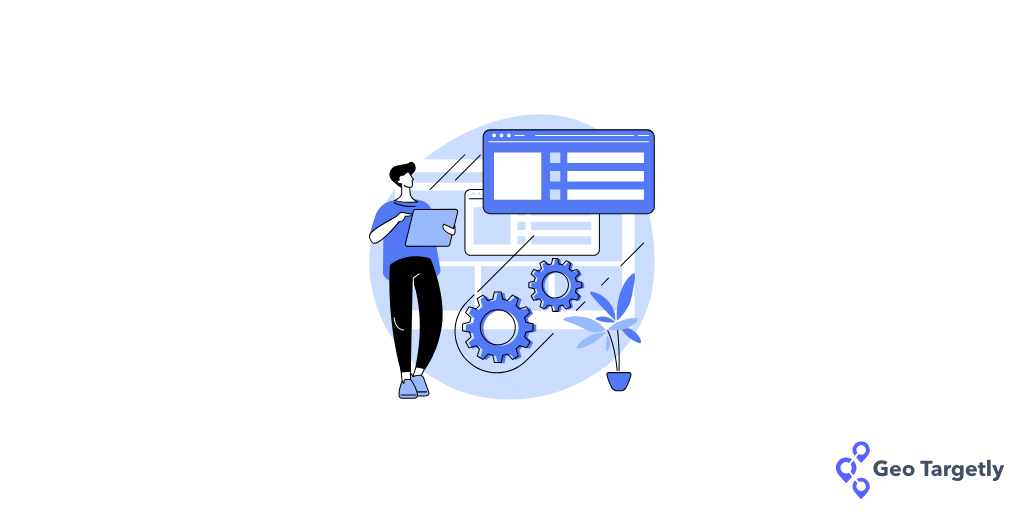



.webp)



